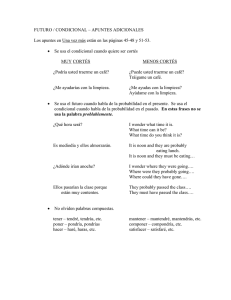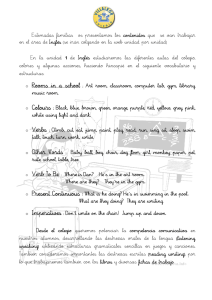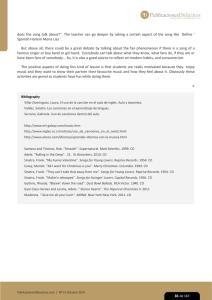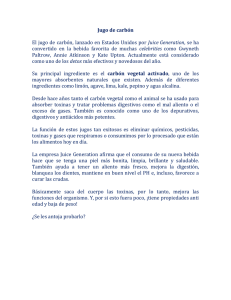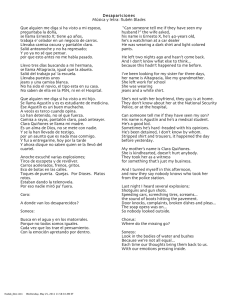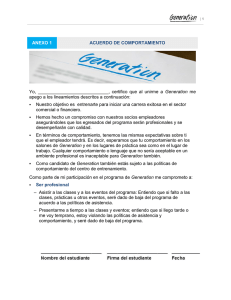PREMIOS EXTRAORDINARIOS DE BACHILLERATO LOGSE
Anuncio
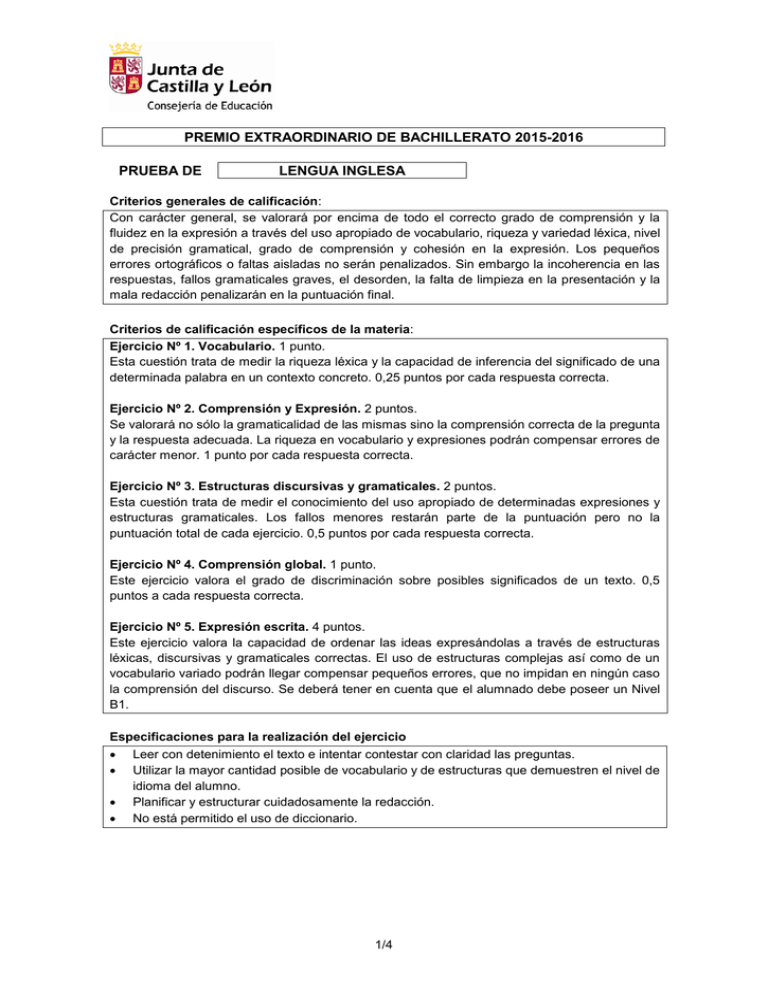
PREMIO EXTRAORDINARIO DE BACHILLERATO 2015-2016 PRUEBA DE LENGUA INGLESA Criterios generales de calificación: Con carácter general, se valorará por encima de todo el correcto grado de comprensión y la fluidez en la expresión a través del uso apropiado de vocabulario, riqueza y variedad léxica, nivel de precisión gramatical, grado de comprensión y cohesión en la expresión. Los pequeños errores ortográficos o faltas aisladas no serán penalizados. Sin embargo la incoherencia en las respuestas, fallos gramaticales graves, el desorden, la falta de limpieza en la presentación y la mala redacción penalizarán en la puntuación final. Criterios de calificación específicos de la materia: Ejercicio Nº 1. Vocabulario. 1 punto. Esta cuestión trata de medir la riqueza léxica y la capacidad de inferencia del significado de una determinada palabra en un contexto concreto. 0,25 puntos por cada respuesta correcta. Ejercicio Nº 2. Comprensión y Expresión. 2 puntos. Se valorará no sólo la gramaticalidad de las mismas sino la comprensión correcta de la pregunta y la respuesta adecuada. La riqueza en vocabulario y expresiones podrán compensar errores de carácter menor. 1 punto por cada respuesta correcta. Ejercicio Nº 3. Estructuras discursivas y gramaticales. 2 puntos. Esta cuestión trata de medir el conocimiento del uso apropiado de determinadas expresiones y estructuras gramaticales. Los fallos menores restarán parte de la puntuación pero no la puntuación total de cada ejercicio. 0,5 puntos por cada respuesta correcta. Ejercicio Nº 4. Comprensión global. 1 punto. Este ejercicio valora el grado de discriminación sobre posibles significados de un texto. 0,5 puntos a cada respuesta correcta. Ejercicio Nº 5. Expresión escrita. 4 puntos. Este ejercicio valora la capacidad de ordenar las ideas expresándolas a través de estructuras léxicas, discursivas y gramaticales correctas. El uso de estructuras complejas así como de un vocabulario variado podrán llegar compensar pequeños errores, que no impidan en ningún caso la comprensión del discurso. Se deberá tener en cuenta que el alumnado debe poseer un Nivel B1. Especificaciones para la realización del ejercicio Leer con detenimiento el texto e intentar contestar con claridad las preguntas. Utilizar la mayor cantidad posible de vocabulario y de estructuras que demuestren el nivel de idioma del alumno. Planificar y estructurar cuidadosamente la redacción. No está permitido el uso de diccionario. 1/4 Smartphone Generation Has Harsher View Of World Guardian Editor's Note: After our in-depth investigation of the issues faced by young adults, Noreena Hertz takes a look at the lives of today’s teenagers, after interviewing 2,000 of them in the past 18 months – and finds a generation who feels profoundly anxious and distrustful. When Sarah woke up after an operation, her first words were not "mom" or "nurse," but "iPhone, iPhone." Eighteen-year-old Sarah is part of the smartphone generation, ages 14 to 21. While technology is important to millennials, who are between 20 and 35 years old, it is essential to those such as Sarah who come after. Their devices are permanently switched on, multiscreening and multitasking. I call them Generation K, after Katniss Everdeen, the heroine of "The Hunger Games." Like Katniss, they feel the world they live in is one of perpetual struggle. Jake, 16, says: “I think we’ve got it much tougher than our parents’ generation. But we can’t give up.” Think about the World Health Organization report, published recently, which suggests that British teenagers are among the most troubled in the world. Our teenagers say they feel pressured by schoolwork and worried about the way they look. Researchers say they were particularly struck by how the life satisfaction of those ages 11 to 15 had gone down everywhere. What’s more, the selfie generation is not, it turns out, that selfish after all: 92 percent believe that helping others in need is important, and 70 percent say inequality is one of the issues that worries them greatly. Members of Generation K do not just want to buy stuff. They also increasingly value things they can actively create. It is a generation of makers, creators and inventors. Sarah builds her own computers and Jake loves making horror films with his pals on his iPhone. This generation is selfie-taking yet unselfish, connected yet lonely, anxious yet realistic, risk-averse yet entrepreneurial. Generation K is a distinct group, a generation very different from those that came before. They know this already: this is a generation unlike any other. EXERCISE Nº 1 (1 point) Find a synonym of the following words in the text: a) Paragraph 1 – skeptical: ___________________ b) Paragraph 3 – appliances: ___________________ c) Paragraph 4 – abandon: ___________________ d) Paragraph 4 – shocked: ___________________ 2/4 EXERCISE Nº 2 (2 points) Answer the following questions using your own words: a) Why does the writer call Sarah and Jakes’s generation “Generation K”? Explain your answer b) Are Generation K members generous? Why? EXERCISE Nº 3 (2 points) a) Rephrase the following sentence using the words given: Noreena Hertz takes a look at the lives of today’s teenagers. A look…………………………………………………………………… b) Rephrase the following sentence using the words “much easier” “I think we’ve got it much tougher than our parents’ generation”. …………………………………………………………………………… c) Join the two following sentences: Katniss Everdeen was the heroine of “The Hunger Games”. Her world was always in perpetual struggle. …………………………………………………………………………………………………… ……………………………………………………………………………………………………. d) Rephrase the following sentence using “however” Although the members of Generation K feel profoundly anxious and distrustful, they are a generation of makers, creators and inventors. …………………………………………………………………………………………………… ……………………………………………………………………………………………………. 3/4 EXERCISE Nº 4 (1 point) Circle the correct option: A. According to the article, why does the generation K feel anxious? a) They are worried about the influence of technology on their lives. b) They are concerned about being judged unfairly by older generations. c) They fear that their future includes money troubles and terrorism threats. d) They feel they are unable to do everything they have to do. B. Based on the article, what are some strengths of Generation K? a) They are optimistic and accepting of others. b) They are highly energetic and politically active. c) They are creative and concerned about issues of equality. d) They are inventive and concerned about appearances. EXERCISE Nº 5 (4 points) Composition (80-100 words) Choose one of the two options. a) Do you think that your parents’ generation was less tough than yours? b) Write about the advantages and disadvantages of the new technologies in our everyday life. 4/4
